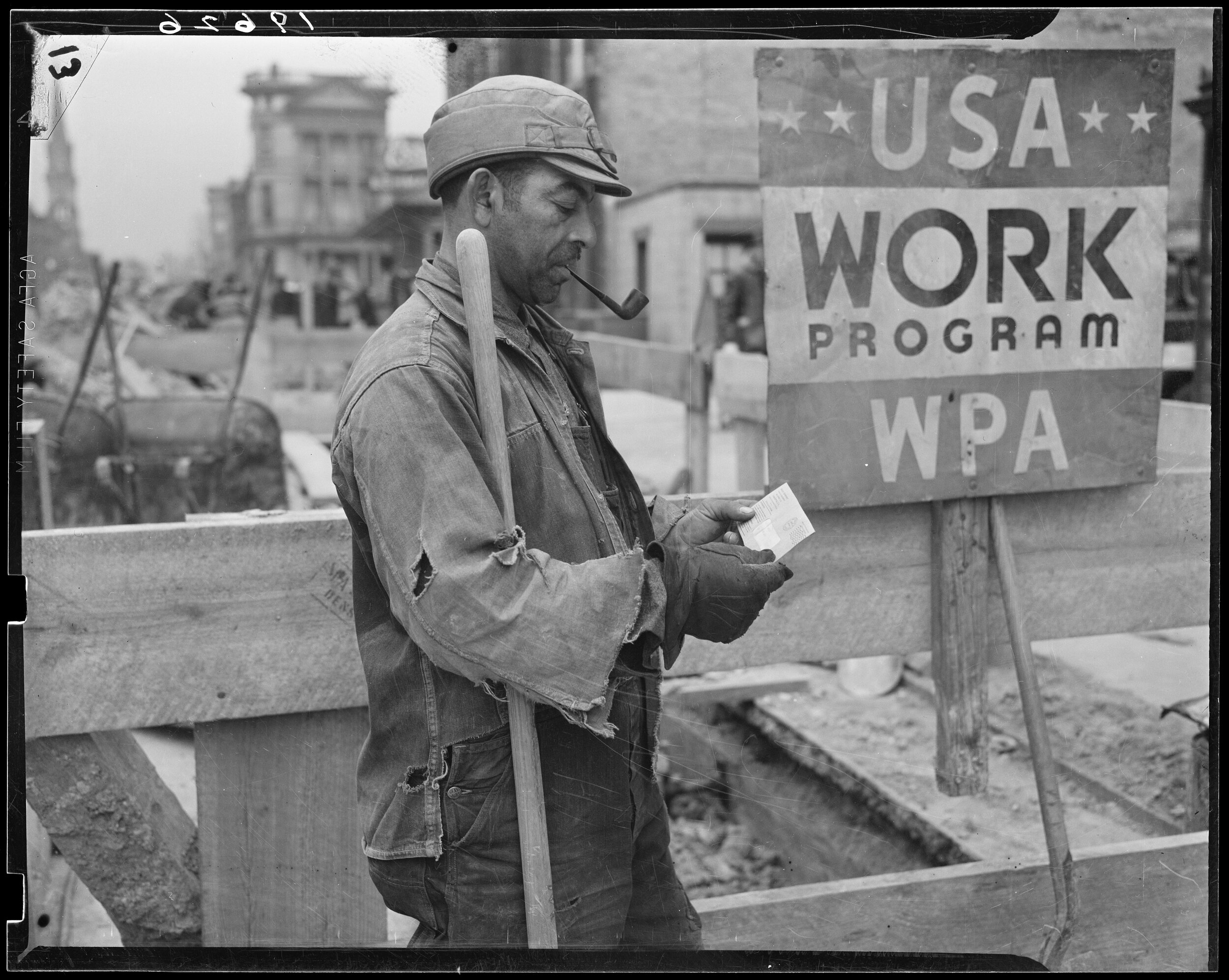The Long View 2007-06-29: Bush Saved; Roman Show Trials; The New Deal and Morale; Libertarian Military Premises; July 7
This blog post by John J. Reilly has an instructive analysis of Franklin Roosevelt’s New Deal and why it worked. Specifically, John argues that it worked even though it failed by the metrics used by both Left and Right in the United States today: GDP growth and unemployment.
The observation that New Deal economic policy was chaotic and often counterproductive is not altogether original, but it is good to be reminded from time to time. However, I think that this address is mistaken when it focuses solely on the economic optimality of the New Deal program, and ignores the link betweem the New Deal politics and the later success of the Roosevelt Administrations foreign and military policies.
Frankly, without the sense of national solidarity that the New Deal created, it is unlikely that the Administration could have brought the country into World War II, or maintained American participation even after Pearl Harbor. Though President Roosevelt did many things on the economic front that were seriously wrongheaded, nonetheless the confidence of the people in the competence and honesty of government grew throughout his long administration. That confidence, represented by the president's high poll numbers, were more important to the future of the nation than a few more points of GDP growth would have been.

Photograph of Works Progress Administration Worker Receiving Paycheck
Public domain
Series: WPA Information Division Photographic Index, ca. 1936 - ca. 1942 Record Group 69: Records of the Work Projects Administration, 1922 - 1944
Bush Saved; Roman Show Trials; The New Deal and Morale; Libertarian Military Premises; July 7
The New York Times is not alone in getting the immigration story wrong. Consider this headline: Immigrant Bill Dies in Senate; Defeat for Bush. Actually, the bill did not just "die": it suffered a greater number of fatal stabs than Caesar received from his colleagues in the Roman Senate. What the Times and many gleeful Republicans fail to notice is that the rejection of this bill saved the Bush Administration despite itself. Had the bill passed, there would have been a rapidly deteriorating police situation and a government ideologically committed to not stopping it. That is the kind of constellation that leads to civil war. So, we have one less thing to worry about.
When I say that the Bush Administration is "saved," I mean that it is no longer committing political suicide in this one regard. What it really needs is conspicuous success in Iraq. Domestically, though, one thing it could do that would increase its popularity would be to pardon poor Scooter Libby. Bush's base, his former base, thinks that Libby was convicted in a show trial, and they have a point. A majority of the people think no such thing, but a pardon would help get Bush's approval numbers up to an achievable goal of, say, 40%. That would make him almost three times as popular as Congress.
* * *
Speaking of Caesar and show trials, readers will note that I have a long review on my site of Erich S. Gruen's revisionist history, The Last Generation of the Roman Republic. As the review shows, I am not much persuaded by the revisionism, but the book does have lots of detail about the nuts-and-bolts of late Republican politics. Much of the political litigation had straightforward objectives. Suits to overturn the results of elections were common and often successful. The reasons for prosecution for maladministration of the provinces or for illegal acts during the Sullan period were often more subtle. The idea was not actually to convict the accused, but to demean him in the public eye; and, often as not, to demean by implication the accused's patron, if he had one. In that sense, Roman political trials were less like the American institution of trials of public officials for "perjury" than like prosecutorial Congressional hearings. Congress rarely needs to learn anything from these investigations, but they do make the witnesses look like defendants.
Two interesting points: these prosecutions were generally conducted by private parties; the difference between civil and criminal prosecution had not gelled yet. Also, the Romans, at least in the period in question, seem to have thought nothing of passing ex post facto laws. I'm rather shocked.
* * *
Speaking of revisionism, we may note the address recently given by Amity Shlaes to the American Enterprise Institute, The Real Deal:
The American consensus is Schlesinger's consensus: that FDR saved democracy from fascism by co-opting the left and far right with his alphabet programs. ...The real question about the 1930s is not whether it is wrong to scrutinize the New Deal. Rather, the question is why it has taken us all so long. Roosevelt did famously well by one measure, the political poll. He flunked by two other meters that we today know are critically important: the unemployment rate and the Dow Jones Industrial Average. In his first inaugural address, Roosevelt spoke of a primary goal: "to put people to work." Unemployment stood at 20% in 1937, five years into the New Deal. As for the Dow, it did not come back to its 1929 level until the 1950s. International factors and monetary errors cannot entirely account for these abysmal showings....New Deal critics were right on the economy, but they were wrong in their estimations of Hitler. To write sympathetically about the Liberty Leaguers is seen, even today, as siding with the appeasers. The incredible rightness of FDR's war policy obscures the flaws in his prior actions.
The observation that New Deal economic policy was chaotic and often counterproductive is not altogether original, but it is good to be reminded from time to time. However, I think that this address is mistaken when it focuses solely on the economic optimality of the New Deal program, and ignores the link betweem the New Deal politics and the later success of the Roosevelt Administrations foreign and military policies.
Frankly, without the sense of national solidarity that the New Deal created, it is unlikely that the Administration could have brought the country into World War II, or maintained American participation even after Pearl Harbor. Though President Roosevelt did many things on the economic front that were seriously wrongheaded, nonetheless the confidence of the people in the competence and honesty of government grew throughout his long administration. That confidence, represented by the president's high poll numbers, were more important to the future of the nation than a few more points of GDP growth would have been.
The lesson for the Bush Administration is painfully obvious. The American economy has actually done very well during the Bush Administration. It is the legitimacy of the government and the coherence of the nation that have suffered.
* * *
But demoralizing Libertarian assumptions also undermine the Terror War. That is at least one interpretation we may draw from an very useful piece of correspondence I recently received from Think Tank Monkey:
From the letters by al-Zawahiri and Attiya al-Jaziri to Zarqawi in Iraq, it is explicit that the taking and holding of territory by al-Qaeda is indeed a priority. The fact that northern Pakistan is well on its way to becoming Afghanistan 2.0 is further evidence of this. Under Fourth Generation Warfare, territory is the last thing that you want prior to victory because once you have it you are subject to attack and have to develop all of those icky hierarchical things to administer your conquered land that make you vulnerable to disruption and attack. No doubt some Fourth Generation Warfare theorist will make the argument that territory is currently superfluous in today's high-tech era. Again, note the intersection between an analytical paradigm and some of the more fantastical currents in anarcho-libertarian thought. The state is certainly in a different situation today than it was 100 years ago because of technology, but I think that the overwhelming evidence is in that it is far from becoming [obsolete].
Think Tank Monkey is my coinage. As the publisher said in the first Spiderman film: "If he will not let me make him famous, then I will make him infamous!"
* * *
But here is more good news: the publication of the motu proprio expanding the use of the Latin Mass is now really imminent: here we have some details of its contents that are more than rumors. From a German source (that's an English link), we learn that the publication date is July 7.
I doubt that the Vatican was much concerned with American news-cycles, but that is a perfect release date for the US. It falls on a Saturday after a July 4th that falls on a Wednesday. Despite the American reputation for never taking a day off, very little work is going to be done the week of Independence Day, so the news media will be desperate by Saturday for something to report.
Just to take the jinx off: this assumes that there are no events like the attempted car bombing that was foiled in London yesterday.
Another ominous note: I got email yesterday from a friend who attends the Indult Latin Mass that I usually do, saying that he was abandoning the Indult Mass in favor of the unauthorized Latin Mass offered by the Society of Pius X. He says that he distrusts the motu proprio. If I understand him correctly, he fears that the liturgical liberals will now deform the Latin Mass as they did the vernacular Mass.
One of the stated purposes of the motu proprio is to placate the Society of Pius X.
Go figure.
Copyright © 2007 by John J. Reilly
Support the Long View re-posting project by downloading Brave browser. With Both Hands is a verified Brave publisher, you can leave me a tip too!



Comments ()